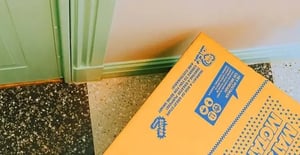Understand your competition and lock in your positioning to succeed in your new market
TAKT: Building a values-based community across markets
Written by Max Riis Christensen, October 2023
TAKT is an online furniture shop rethinking the way to design, build and sell furniture for the mutual benefit of people and the planet.
Founded in the furniture design capital of Europe, TAKT is an exclusive e-commerce Danish brand with pan-European reach and global dreams.
52% of its turnover comes from abroad, and the company sells to 21 international markets, with Germany, the Netherlands and Switzerland its primary markets outside Denmark. Starting out as direct to consumer, today its business is 60-40 selling to business (through architects) versus direct to consumer.
In the latest story in our Succeed Abroad series, Jens Jermiin, CMO and co-founder of TAKT, shares his learnings on market expansion tactics, localisation and values-based versus geographical customer segmentation across markets with our learning community.
“We actually feel that the target audience we speak to is not so much geographically segmented but more value-based. And that's who we're trying to build a community around,” - Jens Jermiin, CMO and Co-founder at TAKT.
Localisation: Values-based versus geographical segmentation
Like any retailer expanding internationally, the question of when, how and indeed whether to localise its webshop for local customers is a big one.
Received wisdom around launching in tough markets, like Germany, demands hyperlocalisation and catering to the needs of the more conservative shopping population. Jens and his team are challenging this assumption.
He says that as a small company, their goal is to be 'simple and delightful' and they think a lot about how to modernise and scale the business.
Should they have a German web platform? Should they conduct communication in German? While they know that Germans are more inclined to buy something they feel closer to and therefore language variation is important, they think of themselves as a value-based brand, speaking across borders.
“We speak to a modern lifestyle, sustainability, quality-conscious, price-conscious consumers who are digitally accessible, culturally aware, and active,” he says.
They feel that the target audience the brand speaks to is not so much geographically segmented as value-based.
“We have like-minded people in Berlin, Hamburg, London, Paris, Copenhagen, Aarhus, and other places. And that's who we're trying to build a community around.”
Right now, they are opting for a one-size-fits-all approach, he says.
“That means the communication we send out is value-based. In other words, we ask algorithms to find people interested in what we want to talk about across the market we're acquiring in,” says Jens.
Localisation: Calculating the ROI on adapting to local languages
TAKT has proved that it can reach target customers in new markets based on its English language site and targeting customers based on values.
The question is not whether the company could sell more in the local language, but how much more and whether it is therefore worth investing in. Or rather, at what point?
“That's the big question. What kind of business case should we set up? And how do we assess the value, both in terms of investment and, most importantly, resource management of establishing different language platforms and driving acquisition in different languages?” he asks.
"We know what we're selling today, but what could we sell if we were fluent in languages? That's something we find difficult to quantify. And when we ask different people, we actually get somewhat conflicting answers.”
In Germany, for example, he says some say that it's crucial to have a German platform and a German payment provider. And then there are others who say that young people (in age and mindset) are quite comfortable with English, and it doesn't matter much.
“We get somewhat conflicting opinions but we also want to be a brand for the many. We want to democratise good design and good quality. So what should we also protect?”
SEO is an area where not optimising its webshop to the local language could be a limitation since people search in their native tongue. Likewise, Google Ads, he says. But it’s about quantifying the cost of adding more complexity to the business at this stage, with the cost of potential lost sales.
“Clearly, there comes a point, there's no doubt that doing the same thing but in the local language would be better. It's just a matter of how much better it would be. Interesting considerations!” says Jens.
Localisation: The value of PR
One area TAKT has found success investing in is local PR to connect with their target customer base, especially in the German market. The company works with an English PR agent who prepares releases and news, which are then translated and shared with media contacts by their agent on the ground in Germany.
The company uses this approach to secure feature articles about the way the company approaches design and its circular thinking mindset. Plus specific product launches. This then generates follow-up inquiries, and the company can select relevant media outlets to conduct interviews and spread the word about its brand to target customers.
Looking ahead
Next up, the company is keen to explore the US and Asian markets and has already partnered with a seller of traditional furniture in Japan.
This means there are different price points in the Japanese market because the seller has a niche, but the company has chosen to accept that because there won't be channel conflicts with Japanese consumers, because they can't get the products from their web shop anyway, right now.
When TAKT expands to Japan or Asia on a larger scale or the USA, it will, however, require a local inventory set-up and a different kind of establishment there because we need inventory.
We look forward to following TAKT’s mission to bring high-quality, affordable design that doesn’t cost the planet and hope we can look forward to hearing more learnings along the way.
Thank you, Jens, for sharing some of your key learnings from TAKT’s story with us and welcome to our Succeed Abroad community!
This is the latest story in our series where 50+ top e-commerce professionals share their learnings on market expansion tactics, localisation and technology across markets with our learning community. Check out the full collection here for more tips.






